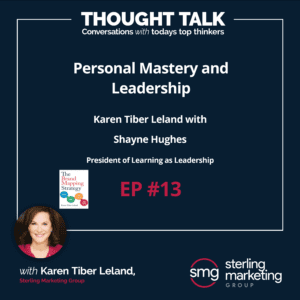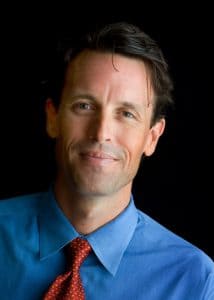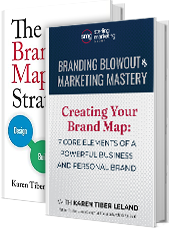
Shayne Hughes, President of Learning as Leadership discusses the connection between personal mastery and leadership presence. What happens when leaders learn to step away from their aggressive egos, and eliminate workplace politics? We will explore how CEOs and C-suite executives contribute to office turf wars and how they can move from reactive feelings in times of crisis and stress to being their authentic selves.
The following is an edited transcript of this podcast. Since how we talk and how write is often very different, this transcript may contain uses of the English language (including grammar) that are not 100% correct. We are counting on your understanding in advance.
Personal Mastery and Leadership with Shayne Hughes
Karen Leland Branding Expert: Hi, everyone. Thank you so much for joining me today. My guest is Shayne Hughes. He is the president of Learning as Leadership. We are going to talk today about personal mastery and leadership. Shayne, thank you so much for joining me today.
It is my pleasure.
I am really happy that you could be here. I just wanted to start by asking you straightforwardly how you define personal mastery.
Personal mastery is our ability in any given moment, particularly in moments of stress, conflict, or challenge, to show up and respond with our best selves, with our most creative and flexible capacity and strengths. What tends to happen in moments of crisis or challenge is that we often feel our success threatened in some way, or we feel threatened by the conflict with the other person. These situations tend to bring out our coping strategies, our reactive behaviors. In fact, in the moment when we most need our strengths and intuitions, we tend to show up with fight and flight behaviors or more inflexible responses. We tend to be suboptimal the moment we need to be optimal. Personal mastery is learning to break out of that paradigm.
It is interesting because a lot of work I do is about branding and personal branding. I work with a lot of CEOs and executives. It’s interesting because I find that people often go away from their authentic brand in those moments of stress. Their true, authentic brands tend to flip into the background when they get into that reactive space, and they don’t have personal mastery skills yet.
Yes, I connect with that. What I see for myself, and also for a lot of clients, is that our authentic brand is about bringing in our true selves, our thoughts, perspectives, and our feelings, to bear in a situation, to show up in an open-hearted and straightforward way, which is the key to personal mastery. Moments of conflict and threat often trigger it. From our perspective, we often talk about how it triggers our ego and our preoccupation of our self-worth, and one of the ways in which we most often get it triggered is around what other people are thinking. Are they being critical of me? They are judging me. They are better than me. They are trying to hurt me. They have an agenda. We have all sorts of thoughts in our minds that make other people feel like a threat to us.
In that moment we are more liable to want to try to protect our image in their eyes and our eyes. So we will do or not do certain things in order to manage the relationship and the other person’s view of us. Those behaviors tend not to be our most authentic selves because when we don’t feel safe, one thing that does not feel okay to do is be authentic. Yet when we don’t feel safe, often, we most need our most authentic selves. Generally speaking if I am not feeling safe with you in an interaction, it’s probably because you are not also feeling safe with me. The question is: Who is going to step forward first?

That’s interesting, because I think about some of the people that I deal with like executives, and when they feel threatened, it is like they disappear. Something else shows up. It’s like a Dr. Jekyll and Mr. Hyde. Someone else shows up in their place. If they do that often enough, what happens is that people start to view them in an untrustworthy way because they are inconsistent. They do not know who’s going to show up. They are often seen as having an inconsistent brand or inauthentic brand because they don’t show up in a consistent way that shows they have great personal mastery of their reactive emotions. You never know how they are going to react. I do not know if you see that a lot in the work that you do because you deal mostly with senior executives and leaders of corporations, yes?
Yes. Broadly speaking, in those moments of conflict, people tend to either withdraw and shut down or to get aggressive and attack. Some people do a little bit of both. Most usually have a dominant response. One of the things that tend to happen that I see is that over time, other people tend to summarize us in their mind as to whatever that behavior is. If I come across as abrasive and aggressive, personally I have an anger problem that I worked on a lot in the past, so if I get angry once or twice, that’s enough. The next time I raise my voice, the other person thinks, “Here he comes again.” People tend to be on the lookout for that. Or if I withdraw but I am still judging you in my mind, I think people sense that. That tends to trigger their own feelings of being judged or not feeling safe, so they get guarded with us. That’s when communication breaks down, and we tend to begin seeing each other in one-dimensional ways. Shayne is this way. Karen is that way.
That’s really well said. In that whole issue of personal mastery, what I hear you saying is that personal mastery is learning to catch that reactiveness before it happens. So that you can make a choice about the way you want to be rather than that default way of being. Would that been an accurate way to say it?
Yes, absolutely. In other words, each of us has our own coping strategies that have developed throughout the course of our lives. When we get down to the root of them, because we are emotionally charged, it feels so personal. To be able to notice that in a moment and realize, “Oh, it’s like my rejection hot button coming up or my feeling-criticized hot button coming up.” We then see that we’re going in our automatic behavior; to catch it in a moment and to re-center is a crucial skill.
Personal mastery also is interwoven in leadership at a broad level, because when you are a senior executive, for example, how you behave has a huge impact on culture and the context around you, the atmosphere that you’re creating. These reactive behaviors tend to ricochet off each other like a pinball machine. If I, as a leader, am able to notice that in a moment, come back, and show up differently, I’ll be able to set a tone for a more functional interaction. If I let myself get hijacked, especially if I’m in a position of authority where I have consequential influence over someone on my team in terms of their performance review or their feeling of safety with their job, there can belong a shadow to those reactions. We tend to underestimate the negative ripple effects when we’re not attuned to those moments.
I really love the way you’ve said it. I’ve never heard it said that way. You said there is a context around you? That’s a great way of saying it. What’s fascinating about that in a lot of ways, what people’s personal brands really are, especially when you’re a leader at work, even if people don’t say this, is the way people experience the context they are in when they’re around you. I’ve never quite heard it put like that; that’s a really brilliant way to say it.
We tend to see context, because our culture is somewhat external, like a static thing. “My organizational culture is like this,” and it’s much more malleable. It’s constantly being created and re-created. In fact, how I show up really has an enormous impact on the atmosphere and on the context. Either I’m leading it to the direction of more transparency and openness, or often in my reactive behaviors, I’m creating an atmosphere of tension, threat, or feeling judged. We started at the outset by saying that personal mastery is learning to notice what happens when I feel threatened, and this pinball machine that I was talking about is this: When I act in a way that’s defensive and you feel threatened, you respond, and over time you can create an organizational culture that is fairly dysfunctional, and people feel they’re under siege.
It becomes the pattern of you and the person as well.
Absolutely.
A lot of your work focuses on dealing with the ego and its impact. What can you say when talking about the ego and your company? What specifically are you referring to? What do you think that impact is on the executives and leaders? On how they’re seen and what they see in other people?
We define the ego, because it’s a commonly used word, in a very specific way, which is the constant preoccupation with our self-worth.
No one listening has that problem, including you and I!
The way to recognize the experience that I’m talking about is to recognize the voice that’s in the back of your mind. It’s constantly chattering about, “Was that smart? Was that intelligent or insightful? Are they criticizing me?” or “That was stupid.” The conversation goes on; it’s a constant chatter. We judge a lot, or say, “I’m my own worst critic.” This is the constant voice of our ego evaluating: I am good or bad, I have succeeded or failed, I am better or inferior to. That preoccupation can become background static, and many people can be overwhelmed by the dominant noise in their brains. That really takes up lot of their creative space and a lot of their emotional energy. So this ego and the noise in our head, they influence our perception and generate emotions, stress feelings, and all of those drive behaviors.
The problem is our ego directs all our behavior, a lot more than what we realize, and it directs our behavior a lot more than our actual most cherished goals. Personal mastery is quieting this ego. One example that I can give is a CEO that I knew. First thing he realized was that one of his very precious goals as a CEO was to unleash the potential of his team. He really wanted to mentor and grow people and help people be their fullest selves. He identified, though, that one of the ways which he evaluated his worth, which was around his intelligence. . That looks something like managing how smart he was in his mind and evaluating, “Am I smarter? Was that a better idea?”

You mean like having to be the smartest person in the room? That sort of a pattern?
Exactly. One of the things he realized was that, in a very unconscious way, he always had to have the very best ideas and ended up not welcoming the input of his team. Not really being able to question in the moment whether his idea or someone else’s idea was the best idea was highlighted as a blind spot for him.
The challenge of this, Karen, was that we all know the correct behavior: to be open, to be curious and not hung up on our idea, and to welcome others’ input. So it’s not a question of do we know what it means to show up in our best way. It’s that if it happens, at some point, that my feelings of worth around my intelligence get triggered, and all of a sudden my goal in that moment becomes to prove my intelligence and not to help my team formulate the best idea even if I look inferior, getting in the survival state in that.
Personal mastery can be, on the one hand, very overwhelming. Why I really love this work and believe in it so much is because we all have a much deeper part of ourselves. We all have this desire to contribute to something larger, to feel connected to other people; to feel like we belong to an effort that really matters to us. This is connected to our sense of purpose. In our modern world, where we are evaluated around our strengths, our performance, and our progression in our career, how are we compared to our MBA cohort back at school? We have this obsession with our self-worth that disconnects us from the “why” and our desire to create things with others. So when we can extract the ego in that way, it’s like creating a sense of inspiration and collaboration for teams and organizations.
It somehow links to the part that I was going to ask you; so, being driven by ego has sort of a negative impact. What’s the alternative?
Sometimes it’s interesting that people say, “Oh, I want people with strong egos. They get things done and drive things forward.” While people with strong egos, in the short term, can sometimes look like they’re successful, in the long term and in a context of team and organization, what happens is that we have a lot of internal jostling, competition, and perceived agendas, because there is always a background tension of “Is this person trying to one-up me?” And so, in organization, what happens is they try to defend their worth and success first, they do their job second, and they worry about the organization’s mission third. And that can actually be reversed.
That’s a great way to say it. I run across people, not frequently, but I do run across people who say, “Look, my brand is that I am just tough.” I actually had a CEO of a fairly large company say to me the other day, “I will settle for nothing less than totally annihilating the competition through complete humiliation.” I sort of didn’t know what to say to that guy, because that’s the opposite of how I think about things in general. I was trying to talk to him about it, and he was so proud that that was his brand and that’s how people knew him. It was his whole orientation around himself.
I don’t see it very often, but I do see it, and I’m sure you must see it in what you do. I guess if someone has spent their whole life doing that and it’s “worked for them,” they are successful, they have money, what’s the motivation for them not to be that way?
This is what we usually hear from people: “This has been my success formula. I drive hard and tend to leave dead bodies in my wake, but I get it done. And if you want me to change that, you’re asking me to give up my success formula and I will lose my edge.” If I can say something blasphemous, I think that’s a fallacy, that we’re actually less successful than we could otherwise be, but we don’t realize that because we are not very connected to the consequences of these behaviors. So people who operate with that mindset; they never feel satisfied on the inside. It doesn’t matter how much success they get, there will always be something missing in them, like there’s always one more thing that they have to do. Maybe it has caused them to show up in their personal life in ways that are dissatisfying.
If you scratch beneath the surface in their organizations, people may be really working very hard, feeling driven and maybe getting a lot of things done, but there’s no inspiration there. Ultimately, in organizations that are really inspired by what they’re doing, I’ll take over the organization that is working very hard every time because the discretionary effort really comes from caring, from really feeling in the core that something really matters. I often hear leaders in organizations who come to our program at the onset, “I want to be the best leader that I could be,” or, “I want to be the best in class in our industry,” or, “I want to be the organization that people envy or people want to be a part of.” That’s a manifestation of a collective obsession that we all have — being the best. But in fact, the best is something that’s all about trying to measure myself over other people.
So it’s a constant competition paradigm. There’s something more than that; personal mastery actually creates even greater performance — and that’s when we don’t worry about whether or not we’re the best. What we’re really connected to is to what we’re doing. Why does it matter? What are we trying to create? We’re creating a culture where people aren’t worried about where they are in the pecking order or who is better than whom. We are creating a context in a culture where we are constantly talking about what we’re doing, why we care about what we’re doing — that’s when you get the whole person. When you get the whole person across an organization, you create something completely different in terms of performance.
What I get from the perspective of the brand of an organization, or of an individual, the brand isn’t just one thing. It’s not some sort of one-dimensional thing. It’s a very rich, complex, multi-faceted dimension. When somebody is really in that place, there’re all those dimensions to it. People are saying that Steve Jobs had a very strong brand. Well, he really did have a strong brand; he had a strong public brand. But it’s very one-dimensional. He was seen, not to take anything away from him, because he was a genius, but a lot of his workers describe him the same way: that’s very one-dimensional. There’re not a lot of complexities about how they talked about him. They talked about him with respect and admiration, but very one-note. There are no people who talked about him with a much richer, deeper, almost in an affectionate way because they brought their whole person to it.
 We have a mutual friend, Joel Kimmel, who was also interviewed in this podcast. He said that he woke up from a dream and he was thinking, “What would my life be like if I stopped blaming myself or anyone else for anything?” And then he said that this became his practice. He was going to stop blaming himself or anyone else for anything. Not that he was going to stop taking responsibility or holding people accountable, but actually stop “blaming people” and himself for anything. Which, as he has said to me, it’s a practice—he’s not always successful at it.
We have a mutual friend, Joel Kimmel, who was also interviewed in this podcast. He said that he woke up from a dream and he was thinking, “What would my life be like if I stopped blaming myself or anyone else for anything?” And then he said that this became his practice. He was going to stop blaming himself or anyone else for anything. Not that he was going to stop taking responsibility or holding people accountable, but actually stop “blaming people” and himself for anything. Which, as he has said to me, it’s a practice—he’s not always successful at it.
His wife, Judy, and I were actually having lunch a year after this and Judy said, “I think I’m going to try that,” and I said, “Me too.” That has actually proven to be so unbelievably rewarding and unbelievably hard. There’s a part of us where there is that survival instinct. It’s something that kicks in and it’s something to fight against, to do with what you’re talking about. Is this what you call personal mastery? Personal mastery is like a muscle that you exercise. It takes an enormous amount of rigor to be able to catch yourself just before you go into whatever your response is and stop, go for some of the bigger and higher things that we’re talking about. So what’s your take on that?
A couple of thoughts. One, I find it helpful to remember that blame is really a reaction of our ego, and sometimes we’re blaming other people and sometimes we’re blaming ourselves. Typically in the situation where there’s a lot of blame and frustration going on, you’ll notice that we go back and forth, almost from one second to the next, where we ask, whose fault is this? We get caught up in each thought of blame as if it were true and valid, when in fact, it’s just a reaction. The whole cycle is just a reaction, and we get caught up in the moment. It’s like I’m in the wrong paradigm in the moment. It’s completely irrelevant, most of what I’m thinking. For those who have had the situation where they were really worked up, or where they often fall to a blame cycle, you see it’s really hard to get out of it. It’s kind of what Joel was pointing to: “If I didn’t spend my time blaming myself or others, what would my life be like?”
I think that part of this is, you’d probably gain back 75 percent of your mental energy. I’m not exaggerating. There can be almost nothing else going on for us — that’s the one thing. I really feel that’s big, and I think about being right in the same way. I’m just not interested in trying to be right about things because in those moments, I’m the one who’s agitated, the one poisoning myself, the one who’s not thinking about what I want to create in my life right now. Because that’s my present moment, and that’s precious. I don’t want to give that away. Being right in blame is like drinking poison and hoping the other person dies; it doesn’t work.
The second thing I want to mention, though, you mention that it’s something that we need to fight against, and I think I would come back to that work and challenge how we think about it because I also relate to what you’re saying, when I’m blaming, or judging, and I try to stop myself from doing it. It’s like trying to stop a wave from the ocean and standing in front of a train and slowing it down. It’s very hard to do, and so you feel like it’s a big fight. I think that’s because that’s not where our leverage is.
Just before this phone call, I also had a phone conversation with someone. I hung up, and there’s this spin going in the back of my mind: self-blame and resentment toward the person. I had stuff going on about other people. So I tell myself, “Oh, I’m in this spin, so what am I going to do about it?” The first thing to do is I shut it down, go to my device, and ignore it. I said to myself, “Wait, what I am feeling here?” When I followed the thread back, that blame cycle always starts in a very specific moment; there’s always a before and an after.
We call that moment a pinch, an emotional pinch, like someone has pinched your arm. Something happens and I have that first burst of hormonal response. The blame then is what follows. That moment was the key to recognize, as it occurs in particular, when something about my self-worth has being triggered. If I can go back and learn to recognize what in my ego has gotten set off there, and extract that out of the situation, it deflates 85 percent of the tension. So in the example I have given you this morning, I realized that something happened, that that person had said something. I didn’t notice it until I went back. These things are like mosquitoes that zoom by your ear.
But they take a micro-second.
They do, and they’re gone. I realized in tracing back to the moment where my discomfort first happened, this person said something, and I had a sense of, “Oh, I’m not making progress here, and I’m failing.” It was my ego threat. “I’m failing right now, and there are other people outside that are going to judge me.” All of a sudden, it was there and gone in an instant, when I began behaving differently during the call and trying to be more convincing as opposed to me drawing the other person out.
You mean more convincing as the reaction to that feeling you had?
I was trying to convince the person to go to my direction as opposed to drawing out some questions like, “What are you trying to say? What do you mean? What’s going on?” The right decision is to ask a question in that moment and not try to convince, but I lost that because I had a pinch where my sense of competence, success, and fear of being judged and failing came out. I was able to go back and recognize, “Ah, right. I got it.” After that, I was off track. So, what’s my goal? Because my goal here is not around my self-worth. My goal goes around what I want to be creating in the world and what I want to be creating with this person. Coming back to that, all the blame evaporates like a San Francisco mist on a hot sunny day. All is just gone and you can see clearly again.
So what you’re saying is that’s where the leverage is, not in the fighting against it but in identifying where that ego pinch happens and going to what the bigger goal is.
Exactly, because when we identify the ego threat, with practice, we can learn to have distance from it. Instead of it being a runaway freight train, it’s gone. What remains is, “What do I want?” and so there’s no fight. Because our natural state, Karen, is to be connected with what we want to create, our sense of purpose, our desire to connect with other people. It’s just that when we’re triggered, we lose all of that…but it comes back right away.
I have done your personal mastery programs for years, and I wouldn’t give myself a gold star for this; however, I would say that certainly I notice there’s a great percentage of time that something will happen and I’ll tell myself, “Karen, that is just your ego in the way you’re talking. It’s just your image. You’re just trying to manage your image; stop it.” So I notice that the ability to see it is far greater than it was before I started the work with you. Personal mastery makes the difference, in a way that you don’t take yourself so seriously. Do you know what I mean?
Absolutely. I think part of what you’re saying is that personal mastery is so subtle. Really, it’s a challenge to recognize it. What’s kind of counterintuitive about it is often, there’s a real feeling of threat that goes on. It’s not like, “Oh yeah, you’re in your ego and you should get over it.” Right now, if this person thinks, “I’m incompetent; they’re not going to respect me anymore,” It results in thinking, “I’m not going to be needed or wanted or be part of the team.” It’s almost like it’s a question of life and death.
It does. It feels like survival.
It really does. That’s why it can be very important. At the same time, if affects when we realize that the tempest that we’ve made of it is not really at stake. So when you say, “Oh, that’s just my ego, and I’m not going to take myself so seriously,” part of that is learning to recognize that there’s not much at stake.
No, not at all. The change is really fast once the swirl stops. The swirl makes it seem a lot more important than it actually really is in 99 percent of the cases.
Absolutely.
Can you talk about Learning as Leadership, your role there and what the company does to foster personal mastery?
So Learning as Leadership, we are really focused on helping leaders and organizations become more aware of how this ego dynamic we’ve been discussing plays out in our leadership and our organizational culture. One of the tragedies of workplace politics and turf wars is that nobody wants them, but we are all caught up in them and powerless about it. What we think is it’s somebody else; it feels like it’s the organization or it is the other person. Our goal is to help executives learn to recognize ways they’re inadvertently and involuntarily reacting and perpetuating this and become much more comfortable in self-diagnosing and talking about it transparently, creating a culture in their team where it becomes commonplace. After that, we dig deeper into an organization with some on-site programs to really help them bring transparency and this self-awareness to their entire culture. My role in Learning as Leadership is as the president, and my focus is on the development and the delivery of our executive programs and of direct client work that we do with large and small organizations.
So can you give your website where people can go and check your work out at?
It’s www.learnaslead.com. You can also put www.learningasleadsership.com. They all go to the same place.
You have a new book coming out on personal mastery and ego. Can you just talk a little bit about that?
Absolutely. We worked with a company called Encore Capital, which was in the financial services sector for about eight years, and the CEO came with his management team. Over the course of this time, we worked with the direct executive team and then with the top 150 leaders in the organization to really bring this level of awareness and more functional behavior to the company. They went through this incredible journey in terms of reinventing what their mission was, how they interact with their clients. During the recession of 2008 and 2009, about 90 percent of their industry went bankrupt. During that same time frame, their growth was 300 percent. They were able to stand up to a subsidiary in India that became number fourteen on the great places to work in all of India. When most of their industry was trying to do the same strategy and nobody was making any money, they were able to extract the dysfunction so the people’s focus was on the work at hand. When he left we decided to work on a book together describing this journey.
We wanted to write a book that was a page-turner, that was engaging to read. I did not want to bore people with all of our concepts and case studies. What we have is our two voices interwoven. He tells the story as a first-time CEO, stepping into this world in a time of intense challenge and all of the ups and downs that he went through in guiding the company. Each chapter has three sections from him and three sections from me where he tells part of his story and I comment on it and relate it to other aspects of our methodology or, more often, tendencies and broader issues that we tend to see in either individual development or in organizations. There is a back-and-forth to give an engaging story that is not a fable. It is a real-life story with real people, and all the results are actually what happened.
That’s an interesting way to do it. What’s the title?
I wish I knew.
Does it not have a title yet?
We have different working titles. The publishers have a whole titling process right now. Our working title is The Ego-Free Organization.
I like that title.
I like it too, but it has ups and downs. What I like about it is that we are trying to say, in everything that we have been talking about now, I can imagine someone going, “I have an organization where we can really eliminate the ego, and what we have instead is people’s creativity, collaboration, and sense of purpose. Sky’s the limit.” I want that, right? But I think, as I mentioned earlier, there are people who like the ego. Ego’s good, and that’s the people that get things done. Our concern is that it could be an initial turn-off because there are people who think that the ego is helpful. They don’t yet realize that the negative ripple effects are dramatic.
 Interesting. I have two more quick questions for you. I ask everyone these questions. So the first one is this: Who is someone in your life who had a negative impact on you, and what did you learn? Don’t say the person’s name!
Interesting. I have two more quick questions for you. I ask everyone these questions. So the first one is this: Who is someone in your life who had a negative impact on you, and what did you learn? Don’t say the person’s name!
There is someone who had an influence on me that was very negative, and a lot of it came through how they communicated their expectations and their perceptions. It came across as judgmental and dismissive. There was often anger mixed in with it. I internalized that in a toxic way. When I think about how I mentor other people, how I say the difficult message, whether it is to someone in one of our programs, a client, someone in my team, and I practice it every day with my children, honestly, it is searching and learning to say the message in a direct and blunt way with love.
That’s great.
It’s a challenge because I have a tendency, like many of us do, that I hold back and not say it because I don’t want to hurt their feelings or I don’t want them to not like me. At some point it builds up and comes out with an abrasive edge, and the person will mostly hear that I am judging them, and they are not really hearing the message. It’s really a challenge for us because if we are delivering a difficult message, someone right away will bring their own self-judgment, right? And their own ego triggers. I have to find a way to be clear and yet emotionally present in connecting with my intention for them, so that I can help them hear the message not only behind my dysfunctions but behind their effectiveness. There are two barriers for us to go through.
Thank you so much for joining me today to talk about personal mastery.
My guest has been Shayne Hughes, the president of Learning as Leadership.
Important Links
 About Shayne Hughes – President of Learning as Leadership
About Shayne Hughes – President of Learning as Leadership
Shayne is President and Culture Change Partner at LaL. Shayne’s expertise in creating cultures of open communication and collaboration has lead to substantial improvements in organizational and personal performance for such clients as Fairchild Semiconductor, NASA, Sandia National Laboratories, Shell Oil, and Encore Capital. He has also taught
Listen | Download | View
Hear the episode of the Branding Blowout Podcast by using the player above OR Click to Download any Episode
This article is copyrighted by Karen Leland and cannot be reprinted in any form, electronic or otherwise, without the express written permission of Karen Leland.
Karen Leland is President of Sterling Marketing Group, a branding and marketing strategy and implementation firm. She works with individuals, businesses and teams to enhance their business and personal brands. Her clients include LinkedIn, American Express, Apple, Marriott Hotels and others. Her ninth book, The Brand Mapping Strategy: Design, Build and Accelerate Your Brand, is due out from Entrepreneur Press in May of 2016.
 About Shayne Hughes – President of Learning as Leadership
About Shayne Hughes – President of Learning as Leadership